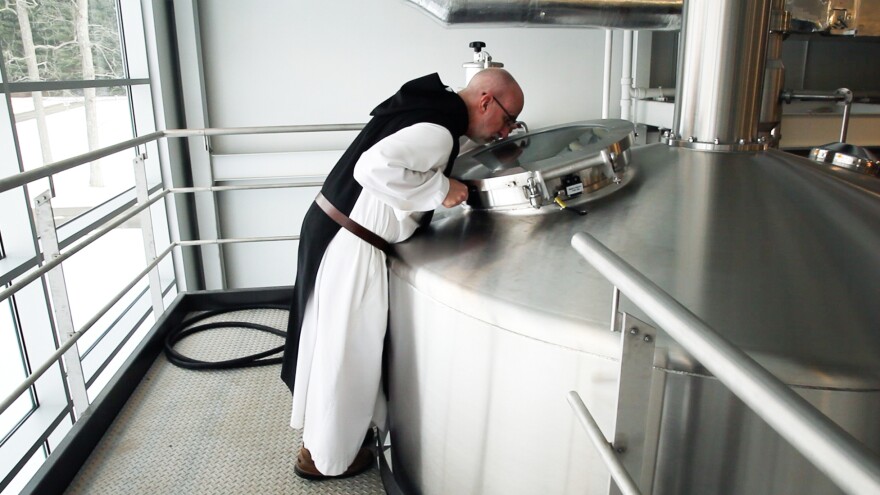The town of Spencer, in central Massachusetts, isn't well known for ... well, anything, really. But it's about to become internationally famous — at least in beer-drinking circles.
Spencer is home to St. Joseph's Abbey, where robed monks are busy brewing the first American Trappist beer. If all goes as planned, Spencer Trappist Ale will be available in Massachusetts retail stores by the middle of next week.
The monastery became one of only 10 official Trappist breweries in the world — and the first one outside Europe — in December.
"I've only come to understand the beer world [in] getting involved in this, but apparently, the Trappists have a reputation for quality in their products," says Damian Carr, the abbot of St. Joseph's.
That's a bit of an understatement. Many other beers bearing the Authentic Trappist Product label are regulars on lists of the world's best.
In some ways, the monks at St. Joseph's might seem like odd candidates to open up a world-class brewery. They don't get out much — "we're not in parishes, we don't teach schools, we don't go to the missions," the abbot says.
What they are is self-sufficient. For more than 60 years, the monks at St. Joseph's have supported themselves by making religious garments and preserves, including jams and jellies.
Still, that wasn't enough, so several years ago, they started looking into brewing.
But there was a problem: The monks knew nothing about brewing — or even drinking — beer. So, one of the monks called up Martha Paquette, the co-founder of Pretty Things Beer and Ale Project in Sommerville, Mass., for help.
"They'd maybe drunk some Budweiser," Paquette says. "So, we had a lot of fun with the monks introducing them to hops, dark beers, richer, stronger beers."
Learning to drink beer was the easy part. To learn to brew it, the abbey sent two of its monks to train at Belgian monasteries and hired a professional Belgian brewer.
The monastery also received some major financing — the monks wouldn't say how much — for a sleek, state-of-the-art brew house. Now, the 36,000-square-foot, stainless steel building sits behind the stone abbey and is mostly automated.

As for their recipe, Rev. Isaac Keeley, the brewery's director, says they wanted to create a new Trappist beer that didn't taste like old Trappist beers. They tried all the classic sweet, high-alcohol styles, but found they liked what was being made just for the monks' personal consumption. What they settled on was a lower-alcohol type called refectory ale.
"The recipe allows monks to drink them on occasion and still go on and do monastic things," Keeley says. "Ours is a golden-hued, full-bodied ale. It has a nice aroma, which kind of whets your appetite."
The brew has already passed one major taste test: To get the official "Authentic product label," Spencer Trappist Ale's first had to win approval from the International Trappist Association.
"We tasted the beer the day we gave the approval," says ITA spokesman Francois de Harenne, and it was considered a good product — deserving to bear the logo."
Indeed, so far, says Abbot Damian, their brewing venture has had great luck. And while Spencer Trappist Ale will be for sale only in Massachusetts for starters, he says the monks hope to expand soon.
God willing.
The Web version of this story includes reporting by Amy Guttman.
Copyright 2020 NPR. To see more, visit https://www.npr.org. 9(MDAxNDQ2NDAxMDEyNzU2NzM2ODA3ZGI1ZA001))

